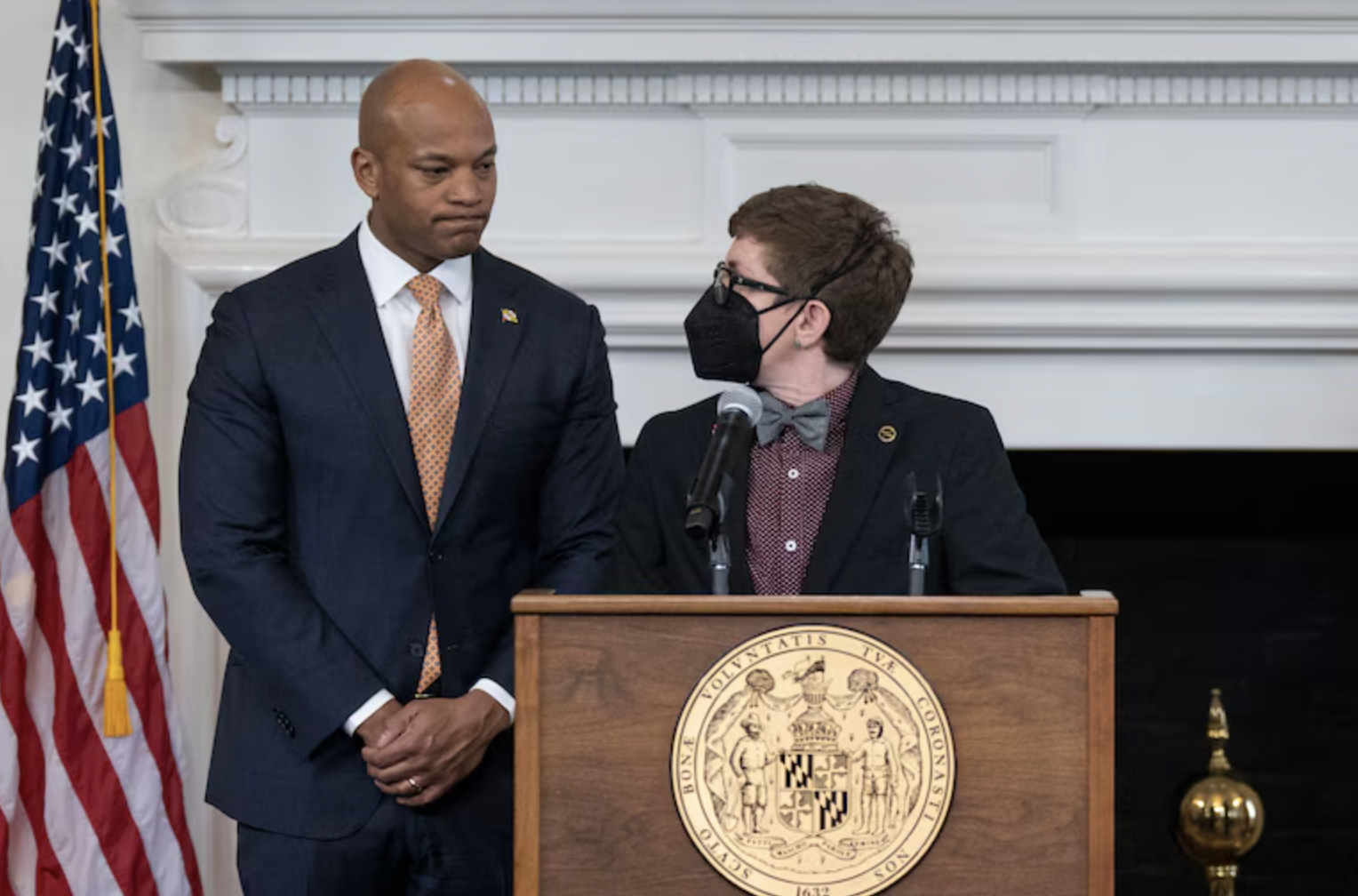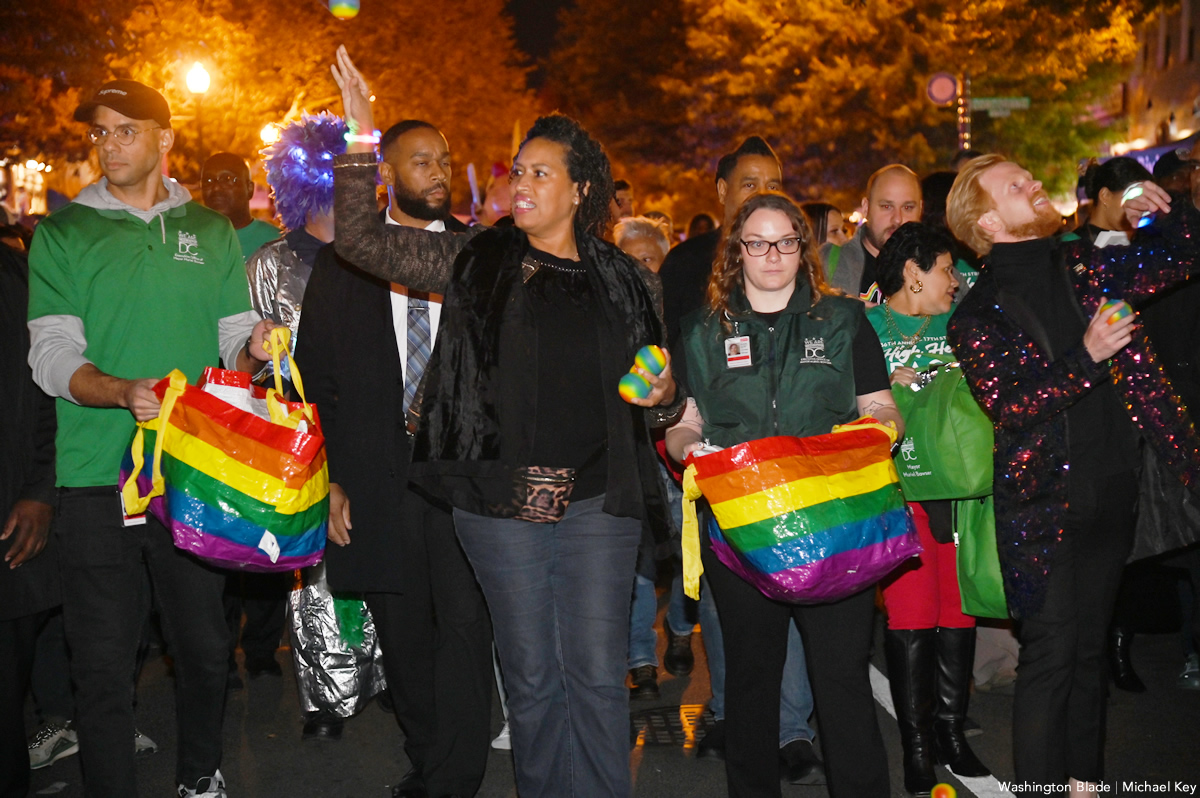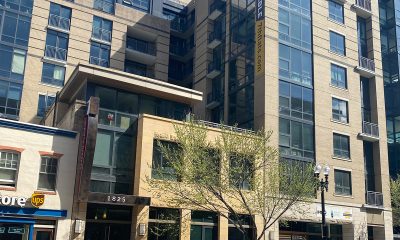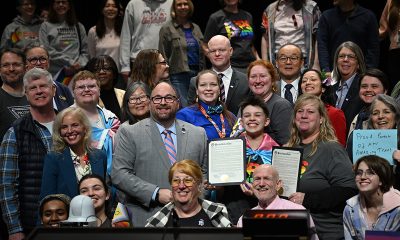Local
Va. guv’s former in-law stumps for LGBT rights
Trans woman asks McDonnell to support bias protections

A transgender Virginia woman is drawing media attention for her role in LGBT activism — and her familial ties to Gov. Bob McDonnell.
Robyn Deane of Midlothian, Va., is gaining notoriety for calling on McDonnell, her former brother-in-law, to come out in support of LGBT non-discrimination protections in Virginia.
“It’s just absurd that we have the issues that we have today,” she told the Blade. “I don’t want anybody to be discriminated [against] on any basis other than their ability to do a job, their qualifications for their job, their performance on the job.”
Virginia is among the 29 states where workplace discrimination based on sexual orientation remains legal. It’s also among the 38 states where such discrimination based on gender identity remains legal. McDonnell, a Republican, has said he doesn’t support legislation that would bar discrimination against LGBT people in state and public employment.
Deane, 55, was married to Ellen Gardner, the sister of Virginia’s first lady, Maureen McDonnell, for 17 years. They divorced in 1999 after Deane came out as transgender. The two have three adult children, ages 26, 22 and 19.
On April 21, in a rally at Capital Square, Deane addressed her ties to the McDonnell family and recalled how her coming out process showed him “the impact that all of this coming out and being who we are can have on one’s life.”
“He had a front-row, center seat because it is his family that was directly affected,” she said at the time.
The Washington Post published a profile of her last week that reviewed the impact she’s having.
Deane, who works as a store department supervisor for The Home Depot, said she’s received calls and more attention since the Post published its article, but her activism is “really about the cause.”
“I’m just the person that happens to have been related, or knew Bob, for all these years,” she said.
Stacey Johnson, a McDonnell spokesperson, said McDonnell’s relationship with Deane is “a personal matter” and that “the governor wishes Robyn the very best.”
Terry Mansberger, president of the Virginia Partisans, a statewide LGBT Democratic group, said Deane’s visibility is helpful and “puts the spotlight on the issue, especially for transgender people.”
“I’m not so sure how much it’s going to do to sway McDonnell, but he did campaign on a platform of being moderate, so this is a good opportunity for him to show support within his own family,” Mansberger said.
Mansberger said he hasn’t spoken with Deane since she emerged in activism, but is hoping to get her involved in Virginia Partisans.
But David Lampo, vice president of the Virginia Log Cabin Republicans, expressed skepticism about Deane’s motives and said her “publicity campaign is more about self promotion than moving GLBT rights forward.”
“Certainly, the people we need most to change their minds on this issue will be totally put off by this campaign and perceive it as an effort to embarrass the governor,” Lampo said. “A behind-the-scenes effort would have made more sense from a strategic perspective, but now it’s too late for that.”
Although she said she hasn’t spoken with McDonnell in more than a decade, Deane noted that she previously had conversations with him when she was married to his sister-in-law.
“We never really agreed philosophically,” she said. “I’m a Christian, and he is, so we come at it from different angles, and he’d say that he’ll pray for me because of something I said.”
Deane said McDonnell’s ties to conservative politics are well known because of his affiliation with Regent University School of Law, where he earned his law degree.
Still, Deane said she considered McDonnell a good friend until her divorce and said their families often visited each other when they lived nearby in McLean, Va.
“Because we’re of a similar age, and really education, it was always interesting talking,” she said. “You could have a conversation with him and you didn’t get chastised for feeling different. You could have a conversation that took on some meaningful discussion, almost where you could agree to disagree.”
Deane recalled that upon coming out as transgender, her former wife didn’t take the news well and the ensuing divorce divided their families.
As an activist, though, Deane said McDonnell should be a focus for LGBT activists in Virginia because of his position as governor and because he’s well regarded in conservative circles.
“He has that connection to the right and because they trust him, or at least they seemingly do, he’s in a unique position to make a difference,” she said, “because he’s witnessed what happens to a family when someone comes out.”
District of Columbia
Capital Jewish Museum announces LGBT exhibition
‘LGBT Jews in the Federal City’ set to open during WorldPride

D.C.’s Capital Jewish Museum has announced plans to open a special exhibition called “LGBT Jews in the Federal City” on May 16 that will remain at the museum at 575 3rd St., N.W. until Jan. 4, 2026.
“This landmark exhibition explores a turbulent century of celebration, activism, and change in the nation’s capital led by D.C.’s LGBTQ+ Jewish community,” according to a statement released by the museum.
“This is a local story with national resonance, turning the spotlight on Washington, D.C. to show the city’s vast impact on LGBTQ+ history and culture in the United states,” the statement says.
The statement notes that the exhibition will take place as D.C. hosts WorldPride 2025, which is scheduled to be held in locations across the city from May 17 through June 8. It points out that the LGBT exhibition will also take place during Jewish American Heritage Month in May and Pride Month in June.
“‘LGBT Jews in the Federal City’ will present more than 100 artifacts and photographs, representing the DMV region’s Jewish LGBTQ+ celebrations, spaces, joys, and personal stories,” the statement adds.
It says a centerpiece of the exhibition will be The Bet Mishpachah Collection, a new museum acquisition focusing on the LGBTQ supportive synagogue founded in D.C. in 1975 that is celebrating its 50th anniversary this year.
“This assemblage represents one of the most extensive archives of an LGBTQ+ Jewish congregation in the nation,” the statement says. “Selections from the collection will be on view for the first time.”
Other aspects of the exhibition, the statement says, include campaign posters and photos related to D.C. gay rights pioneer Frank Kameny, who founded D.C.’s first “gay rights” organization in the late 1960s; archival records from the Washington Blade, the exploring of “the wide variety of changes made at area synagogues,” and a panel from the AIDS Memorial Quilt that features a prominent Jewish Washingtonian who was lost during the AIDS epidemic.
“Through prompts, questions, and thoughtful design throughout the exhibition, visitors will be encouraged to ponder new ways to understand Jewish teachings and values as they relate to gender and sexuality,” the statement points out.
“After leaving the exhibition, visitors can contribute to the Museum’s collection and storytelling by sharing photographs, personal archives, or by recording stories,” it says.
“As board president at the Capital Jewish Museum and longtime member of both the Jewish and the LGBTQ communities in D.C., I am very proud that we are the first museum to bring to life the stories of the LGBTQ Jewish community in the federal city,” said Chris Wolf, president of the museum’s board of directors.
“We are deeply honored to present this show, our first self-curated special exhibition – adding Jews into the rich, proud history of LGBTQ+ D.C.,” said Beatrice Gurwitz, the museum’s executive director. “This exhibition will help write the local, regional, and national history of the Jewish LGBTQ+ community.”
Museum spokesperson Kendra Rubenfeld said Jonathan Edelman, the museum’s co-curator who is gay, played a key role in initiating the exhibition. “He saw a hole in the history of D.C.’s Jewish history museum and knew he had to fill it,” Rubenfeld told the Blade.
Among the “Premier Sponsor” financial supporters of the LGBT exhibition, according to the museum statement, is Jeffrey Slavin, who’s gay, and has served as the mayor of Summerset, Md., in Montgomery County, since 2008.
“I think it’s so important for us to tell our stories,” said Slavin, who said he was honored to help support the exhibition in his role as a gay elected official who grew up in the Jewish community in the D.C. area.
Maryland
Trans Maryland founder: Trans people ‘are afraid’
Lee Blinder urged Gov. Wes Moore to do more for trans rights

The Washington Blade on April 4 spoke with Lee Blinder, founder and executive director of Trans Maryland.
Trans Maryland, formerly Trans Healthcare MD, is what the organization’s mission statement describes as a “multi-racial, multi-gender, trans-led community power building organization dedicated to Maryland’s trans community. By trans folks, for trans folks.” The Blade reached out to Blinder after they confronted Maryland Gov. Wes Moore on the Transgender Day of Visibility.
BLADE: It was reported in the Baltimore banner that you confronted Wes Moore about his inaction to the rise of anti-trans rhetoric during this administration. So would you mind going a little bit deeper into that?
BLINDER: The intention of what I shared is to show to the governor that this is a community in distress. You know, we are in a real state of emergency for the trans community and there are very few opportunities that the community has to share this directly with the governor. What we wanted out of that conversation was to not only be heard, but to see functional action. We’re really grateful to the governor for everything that he’s done in the past for this community, but the circumstances have changed and we really need to see very specific actions taken in order to ensure this community has the ability to exist in public space. um and that’s incredibly important to both myself as well as all the community members that I’m talking to.
It is not an absent issue. It is a very forefront connected to every single part of our daily lives as trans people in the state of Maryland. And so we want to see our leadership, you know, being who we know what they can be for this community. I think that was that point of what I shared on Monday, attempting to convey all of the feedback that I’m hearing when I’m out in community that folks are sharing with me from both trans people and the families of trans people about what is urgently needed and that very specific action taken in order to ensure that, again, we can move out and exist in publicly.
BLADE: Have you heard anything specific recently about any threats, scares, or insecurities coming from trans Marylanders at all?
BLINDER: Oh, absolutely. Every trans person I’m talking to is having really difficult conversations amongst the community and amongst their families, whether chosen or families of origin. We’re seeing people are afraid right now. The federal government is targeting our community very directly. What that means is that people are noticing they’re taking note. They’re wondering what the actions that a supportive state like Maryland will be taking. We want to see a really specific messages being shared, as well as specific action being taken as a result of that.
Everything from our identity documents to the ability for some of our most vulnerable community members or children to participate in sports. Every aspect of public life for trans people is being targeted by this federal administration. Here trans Maryland, we have the largest name and gender marker change program for adults in the state and people are sharing very directly their concerns. People are concerned about their documents, about access to documents, about ensuring that if they need to, they can safely and effectively leave the country, if that comes to it. Those are really difficult conversations to be having. We’re a country where people have traditionally sought sanctuary and safe haven from other countries where the ability to live openly is trans and openly queer is not always possible. We’re in a really unique situation where we have people who are seeking asylum in the U.S. as trans people and then at the same time, we have people who are wondering what other countries, the policies of asylum, you know, could be for Marylanders. I think it really speaks to the state of the situation for trans people.
Every day, I’m very, very aware of how grateful I am and how lucky I am to be here in Maryland. I’m not running Trans Texas, Trans Florida, or Trans Oklahoma. My heart goes out to our siblings in those states where they’re receiving a tax from both the federal government and from their state government. We’re absolutely not in that situation in Maryland, and we have leadership like Gov. Moore to thank for that, but we also really need to be heard about this specific urgency of the situation that we’re in right now. We’re eager to partner with and to work with the governor. We want to find solutions so that the people that we’re serving and that we’re responsible for have what they need and are taken care of here.
BLADE: Are there any plans in place right now to help pick up the slack at all?
BLINDER: We’re certainly doing everything possible and trying to ensure that there aren’t state resources that aren’t being urgently and specifically immediately directed towards this population. We will continue to advocate for that and we will turn to the residents of Maryland beyond to fundraise so that we can ensure that we’re meeting those needs for people as much as we possibly can. We are a very grassroots organization. In many ways benefits us because we can be nimble and respond very quickly when situations happen, but we do work within systems and we want to see those systems responsive to trans people’s needs, and we want to see those systems taking action, particularly right now because things will continue to get more difficult. So the urgency of the time is very, very, very present.
BLADE: Given said urgency and also being grassroots, have you worked with any other organizations within the states?
BLINDER: We partner with and work with organizations all the time. We always prioritize both trans-led initiatives and work because as trans folks we are living our realities, so we know best what our communities need. We also work with larger systems, our name change program for example. We are helping folks navigate the process through the Maryland judiciary. Those are the larger, state-based systems that we want to see and collaborate with to ensure that they’re ready and prepared to work with the trans community and families of trans kids.
So, it is a great privilege and pleasure that we have to have so many amazing partners. We have for the last seven years gone to Pride festivals all over the state, and we work closely with all of those Pride organizations. When we started doing that, we were pretty much the only trans organization at almost all of those pride festivals, so it’s really wonderful now to see many more trans organizations are represented at those pride festivals. The Pride festivals are a really amazing way that we have connected with the community and that we’re accountable to the community. And so we’re sitting there at a table, folks can come up to us and share things are going well, if things aren’t going well, and what they need directly from us. That has been a real privilege to be able to just steward the needs of the community, to hear them and then to be accountable to and responsible to the community for our actions, what we do and how we serve. It is something that we are committed to and with that commitment we strive to make sure every member of the community is taken care of, seen, and represented.
BLADE: Have you heard of the report that recently came out from Mady Castigan and Tom Sayers about a lawsuit going on about the mistreatment of uh incarcerated trans women right now. specifically in Maryland prisons?
BLINDER: Not familiar with that specific lawsuit, but we have seen lawsuits about ] treatment. I think that there was a lawsuit, particularly of incarcerated trans women I believe a year or so ago where the judge had issued a preliminary injunction and a temporary restraining order requiring that a few women were moved to the correct housing. Currently, all of the incarcerated trans women that we are aware of are housed with men, which is against the recommendations of the Prison Rape Elimination Act (PREA) for housing and for folks’s safety. That court case also required that the individuals named would be required to be given their medications, their gender affirming hormone therapy on video because it was alleged that folks had not been receiving those medications even though they were prescribed to them. I’m not familiar if there’s something new within the last week or two. I would love to to learn more.
We were very involved in the Transgender Respect, Agency and Dignity Act, which is around conditions of confinement for transgender people. That bill did not come back into the legislature this year, but we are going to continue to be extraordinarily concerned with the treatment of incarcerated trans people in the state and are committed to working to both address those issues on a systemic basis and those as well on an individual basis for community members. For the individuals who are currently incarcerated, we want to ensure that they are receiving medications, that they should be receiving, they are housed according to where is safest for them, that they’re able to be referred to respectfully, that they are not experiencing violence based on their identity.
BLADE: With World Pride coming to Washington this June, do you feel like there’s going to be a need for a slight shift from that celebration to focus on the encroaching anti-LGBTQ rhetoric that’s very much becoming legislation.
BLINDER: Yeah, a really great question. And I think it makes me really grateful that I have access to some of our trans elders and certainly broader movement elders who can share a little bit with me about how our community has survived difficult times. I think a takeaway that I’ve had surrounds the challenges during the AIDS and HIV crisis where people were crossing names out of those address books. Page after page of their friends as they were dying. and have that amount of community loss and then, wondering, “how did people survive that experience?” Those who made it through the crisis and those who were supporting folks through the crisis as well.
What folks have shared with me is that it was so important to still go out and feel joy and dance and try to forget just for a little while about what was happening because otherwise, if we can’t find joy, that’s the one thing that they want to really steal from us is our ability to feel joy to to have pride in who we are and we just cannot let them have that. So I think the activism, all of the work that we do is so incredibly important, but in order to do this for several months, several years, decades, even, it really becomes so, so important to also make sure that we are pursuing joy and happiness wherever we can find it, wherever that joy is, you know, whether it’s going to pride, whether it’s having a quiet game night in your friends. However you best find joy, it is absolutely essential that we find that because, otherwise burnout is waiting right around the corner and we cannot afford to lose our brilliant activists, especially like the upcoming generation of activists. We cannot afford to lose folks in this movement. There aren’t that many of us and the key to making it through and not burning out is weaving joy tightly through all of this work.
I’m both trans and I’m also Jewish. My next-door neighbors growing up were Holocaust survivors. They were in Auschwitz. There was one couple, a woman, her sister and her sister’s husband. They were very close friends and they would all spend a lot of time together. The two sisters, they were both really short because they were deprived of nutrients when they were growing. One of them had been shot by Nazis while on a march, but both of them survived. I found I was so grateful to have gotten to meet them because these were folks who had been through such an unimaginably horrible experience. and they still liked people. They didn’t believe in God anymore, but they still liked people and they had a joy for a life that I found was really impactful to me to see.
It did make me know and believe that people can come through really terrible experiences and that the bonds that we create with one another and support that we offer to one another in community, for me, that’s what my trans elders and my queer elders have shared with me. My neighbors made it clear to me that the sun still keeps coming up every day regardless of whatever is happening on this planet. I really believe in continuing towards that world that we want to see happen So as pride is coming, whatever ways that we can find joy and ensure that we’re taking good care of one another and also ourselves too. That’s what will get us through.
BLADE: What does the future look like right now for Trans Maryland? What does the next move that you guys have going on to try to keep up the momentum while you have it?
BLINDER: I think we are going to win in the end, our community. You look at the data and generations that are coming up right now, even in this toxic climate, are extraordinarily more comfortable than my generation and the generations before me and sharing who they are. And Cisgender people keep making more of us, you know? So we’re going to continue to exist and we always will. The longer term vision is that I know that we are going to be here and we’ll always be here. There’s really nothing they can do about that. In the short term, you know, we’re going to continue to serve trans Marylanders and the families of trans people in Maryland. We’re going to continue to take care of one another and to try to find our joy wherever we can.
For me personally, how I get through is like a strong sense of defiance. If they want to take my joy, they can take it from my cold dead hand. What they want is for us to feel afraid and small and disempowered No, they cannot have that. They just can’t have it. So it’s like a anybody got a defiance streak in them just to find that defiant streak and say, absolutely not, they don’t deserve that from us.
**
Trans Maryland has a rally on April 22 with the MoCo Pride Center, in front of the U.S. Supreme Court before it hears Mahmoud v. Taylor, a case that will determine whether public schools violate parents’ religious freedom when they compel elementary school children to participate in instruction on gender and sexuality without notice or the opportunity to opt out.
Blinder is also a co-chair of the Coalition for Inclusive Schools and Communities that supports LGBTQ youth and inclusive schools and communities, along with Phillip Alexander Downie, the Rev. AliKofi K.C. Bell, and Adrian Hinderlie.
District of Columbia
Local officials weighing impact of Trump’s D.C. executive order
‘Safe and Beautiful Task Force’ slammed as ‘blatant federal overreach’

D.C. government officials and local LGBTQ rights advocates have expressed differing views on the potential impact of an executive order issued by President Donald Trump on March 27 that creates a federally controlled D.C. Safe and Beautiful Task Force.
A statement released by the White House says the task force, among other things, will be directed to, “Surge law enforcement officers in public areas and strictly enforce quality-of-life laws in public areas like drug use, unpermitted demonstrations, vandalism, and public intoxication.”
The White House statement adds that the task force will also, “Maximize immigration enforcement to apprehend and deport dangerous illegal aliens, including monitoring D.C.’s cooperation with federal immigration authorities.”
According to the five-page executive order, the newly created D.C. task force will take on a wide range of other functions, including overseeing and coordinating “more robust local law enforcement presence” throughout the city, including in federal parks such as the National Mall, museums and national monuments, Union Station, and widely used public roads and highways such as Rock Creek Parkway.
One of its provisions calls for government entities to provide “assistance to increase the speed and lower the cost of processing concealed carry license requests in the District of Columbia.” The provision refers to D.C.’s process for licensing the right to carry a concealed handgun.
D.C. Congressional Del. Eleanor Holmes Norton (D-D.C.) is among the city’s elected officials who have denounced the D.C. Safe and Beautiful Task Force as a serious infringement on the city’s locally elected home rule government.
“President Trump’s thoroughly anti-home rule EO is insulting to the 700,000 D.C. residents who live in close proximity to a federal government, which continues to deny them the same rights afforded other Americans,” Norton said in a statement.
“The task force created by the EO would not include a single D.C. official to represent the interests of the people who reside within the District,” Norton said.
D.C. Mayor Muriel Bowser, who has been cautious in her response to the Trump administration’s controversial policies to downsize the federal government, has not yet taken a position on the Trump D.C. executive order, according to mayoral spokesperson Daniel Gleick.
D.C. City Council Chair Phil Mendelson (D-At-Large) is among the local officials and community advocates who have said it is too soon to make a definitive judgment on the Trump created task force’s impact on D.C. home rule. Mendelson pointed out at a March 31 news conference that a large part of the stated actions for the task force are aimed at overseeing federal parklands and other federally controlled areas such as national monuments.
“I don’t want to say that everything in there is innocuous,” Mendelson told reporters at the news conference. “But overall, a lot of it, if not most of it, is directives to the federal government to do things that are within the federal government’s purview, not as a let’s step on home rule,” Mendelson said.
But others, including Norton, said they believe the overall executive order and the task force it creates will result in a serious infringement on D.C. home rule and possibly the rights of D.C. residents.
Gay D.C. Council member Zachary Parker (D-Ward 5) issued a statement pointing out that over two decades D.C. has had a balanced local budget, achieved “historic decline in crime,” and had one of the nation’s “fastest improving urban school districts,” suggesting the Trump task force was not needed.
“Based on my reading of the executive order, I think it is impossible to determine if it will have any direct impact on the LGBTQ community in the District,” said longtime D.C. LGBTQ rights advocate Peter Rosenstein.
But Rosenstein added, “The EO is an offense to all the people of the District, as it disregards home rule. It will be crucial to see who is finally appointed to the panel and see what their plans are to implement it.”
He was referring to the fact that the order itself and the White House so far have not announced which federal officials will be appointed to serve on the task force. However, the White House statement names nine federal agencies whose leaders or designees will be among the task force’s members. Among the agencies named are the Departments of Interior, Transportation, and Homeland Security, along with the FBI and the U.S. Marshals Service.
The leaders of D.C.’s local LGBTQ Democratic Party and local LGBTQ Republican Party organizations – Capital Stonewall Democrats and Log Cabin Republicans of D.C. – had sharply differing views on the impact of the executive order and task force on the LGBTQ community.
The Washington Blade reached out to the two leaders for comment.
“This executive order is not about D.C. ‘Safe and Beautiful’ – it’s about control,” said Capital Stonewall Democrats president Howard Garrett in a statement to the Blade. “It’s about stripping away the power of the people who live, work, and love in the city,” Garret said.
“History has shown that when authoritarian leaders impose their will on a people without their consent, it is the most vulnerable – LGBTQ+ individuals, people of color, the unhoused – who bear the brunt of that oppression,” Garret’s statement continues. “We will not be silent as our community is put at risk under the guise of ‘safety and beautification.’”
He added, “Capital Stonewall Democrats reject this blatant federal overreach, and we stand firm in the belief that D.C.’s future must be decided by D.C. residents – not by those who neither understand nor respect our community.”
Andrew Minik, president of Log Cabin Republicans of D.C., expressed strong support for the Trump executive order and its D.C. task force, saying it will have a positive impact on the city as a whole and on the LGBTQ community.
“The only thing negatively impacting D.C. residents is the incompetent leadership of local Democratic politicians,” Minik said in his own statement. “’Home rule’ means nothing when the people in charge surrender the city to criminals, allow our parks to become open-air drug markets, and treat public spaces like dumpsters,” he said.
Minik called the commission “a breath of fresh air,” adding, “Finally someone is stepping in to do what the city government refuses to: clean up the filth, restore safety, and make our Nation’s Capital beautiful again.”
Asked by the Blade if he feels the commission could have a negative impact on the LGBTQ community, Minik said, “Absolutely not.” He added, “What does harm LGBT Washingtonians is having to walk through trash-strewn streets, sleep deprived from sirens and gunshots and live in fear of crime.”
“This commission is a win for LGBT residents who are sick of being ignored by a local government more concerned with virtue signaling than actual leadership,” he said. “The LGBT community in D.C. and across the country deserves more than broken promises and chaos. We deserve leadership that works, and President Trump is giving us that.”
Norton and other city officials have disputed claims by Trump and his fellow Republicans that crime in D.C. has been out of control.
“The ‘Fact Sheet’ about the EO currently on the White House website states that crime in D.C. is ‘near historic highs,’” Norton says in her statement on the executive order. “This simply isn’t true. It’s contradicted by the Department of Justice, which noted on January 3 that violent crime was down by 35% in 2024 and overall violent crime in D.C. is at a 30-year low,” according to Norton.
“Like cities, states, and counties across the country, D.C. has passed laws to support and protect the safety of all its residents, regardless of immigration status,” Norton said. “In passing these laws, D.C. followed its values and was convinced of the benefits for the entire city,” she said.
Details of the Trump D.C. executive order and the task force it creates can be accessed on the White House website.




















